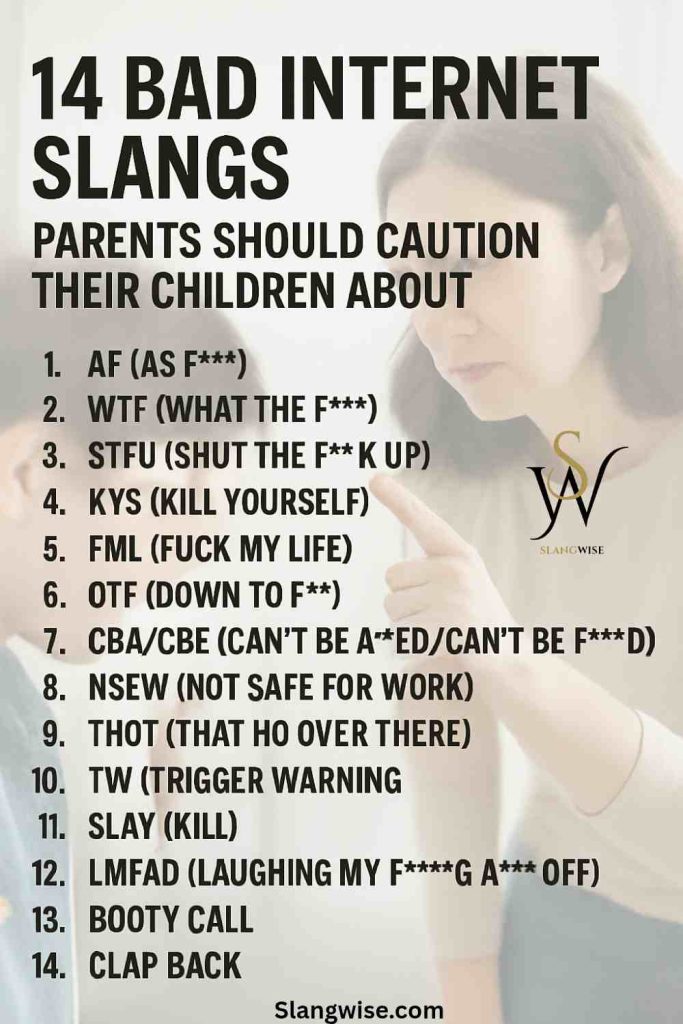
As I navigate the ever-evolving world of internet slangs (majorly, Gen Z’s and Gen Alpha Slangs) , I can’t help but notice how quickly slang words changes.
New slangs crop up almost daily, and what may seem like a harmless term to kids can actually have inappropriate or harmful undertones.
Over time, I’ve come to realize that many of these online slangs and expressions aren’t always as innocent as they seem, most especially when it comes to children.
As parents, we have the responsibility of ensuring our kids communicate in healthy, respectful ways.
With that in mind, I’ve decided in this post to address some of the most concerning slang terms that children should avoid.
These are bad slang terms that, though popular, can influence unhealthy attitudes and behavior.
In this post, I’ll walk you through 14 bad internet slang words that every parent should be aware of, and explain why we should be cautioning our kids about them.
Table of Contents
Bad Internet Slangs in a Nutshell
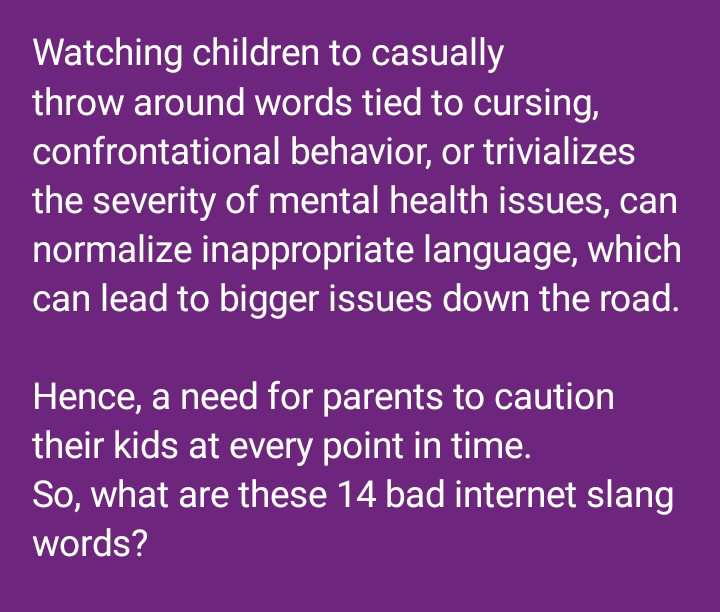
- Internet slang evolves quickly, and staying informed helps parents protect their children from inappropriate language.
- These 14 vad slang terms like KYS, AF, WTF, STFU, FML, CBF, NSFW, THOT, TW, slay, LMFAO, Booty Call, Clap back, and DTF can be dangerous and should never be used in casual conversation, especially by children.
- Teaching kids healthier ways to express themselves can steer them away from crude or disrespectful language.
- It’s important to talk openly with your children about the impact of words and help them understand that their language shapes their reputation and self-respect.
NOTE: To be updated, but if there are other slang terms you feel should be included, do share them in the comment below. Thank you.
14 Bad Internet Slangs Children Should Never Say or That Parents Should Caution Their Children About
1. AF (As F**k)

“AF” is a popular acronym used to emphasize a statement. You might hear kids say things like, “That movie was amazing AF” or “I’m so tired AF.”
While the term has become so common that it’s almost mainstream, its origin is rooted in a curse word, making it inappropriate for children to use.
It can slip into casual conversation without a second thought, but its crudeness is something that shouldn’t be part of a child’s vocabulary.
Why Parents Should Be Concerned:
Even though it’s often used in a light-hearted context, this term relies on vulgar language.
Watching children to casually throw around words tied to cursing can normalize inappropriate language, which can lead to bigger issues down the road.
Slangwise Tip:
Encourage your child to express themselves using more constructive language. Reinforce that it’s important to communicate effectively without relying on profanity to make a point.
2. WTF (What the F**k)
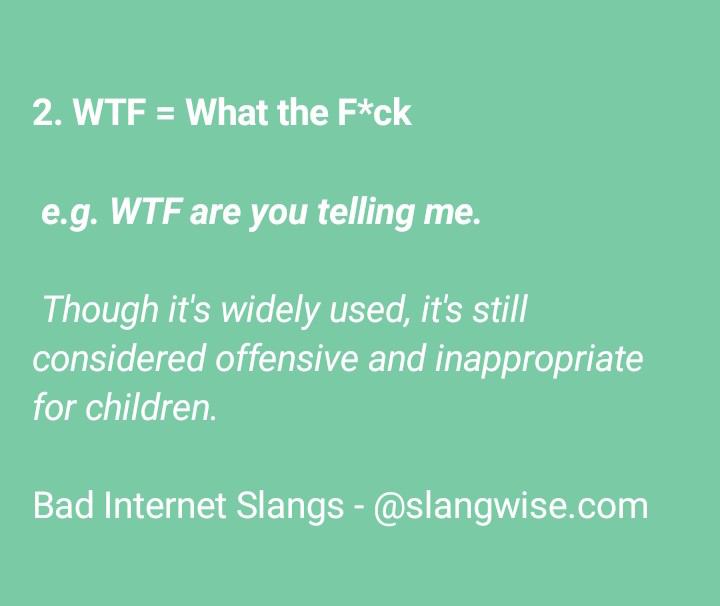
WTF is used to express disbelief, confusion, or surprise. It’s a phrase that often pops up in digital conversations or social media comments.
Though it’s widely used, it’s still considered offensive and inappropriate for children.
Why Parents Should Be Concerned:
This phrase uses one of the most offensive curse words and can lead to the normalization of disrespectful communication.
It’s a term that’s easy to pick up but hard to unlearn, especially when kids start using it in front of teachers or family.
Slangwise Says:
Help your child express confusion or surprise with more suitable alternatives, like “What is going on?” or “That’s unbelievable!” This will encourage more respectful communication.
Read Also: 7 Innocent-Sounding Slang Terms Secretly Fueling Hate Online: You Might Be Unintentionally Spreading Hate Online – Find Out Which 7 Slang Terms to Watch Out For.
3. STFU (Shut the F**k Up)
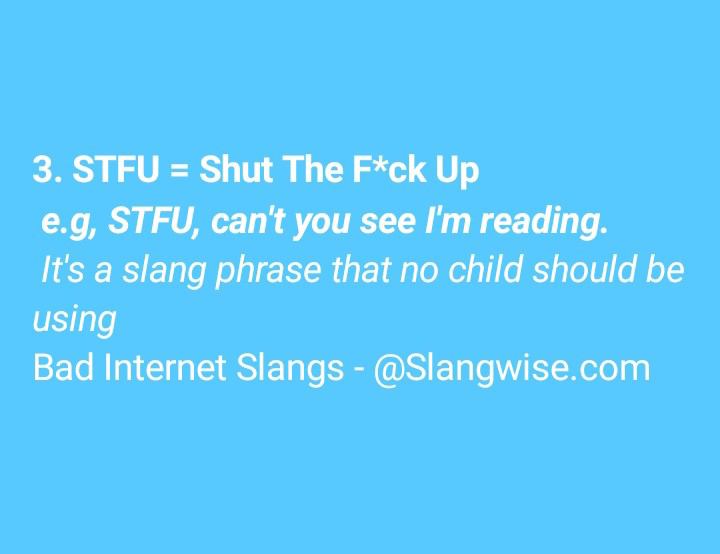
This slang term is used to tell someone to be quiet in an extremely rude and aggressive way.
It’s often used in heated online arguments or when someone disagrees with another’s opinion.
It’s a phrase that no child should be using.
Why Parents Should Be Concerned:
Using this phrase normalizes a harsh way of dealing with disagreements and discourages constructive communication.
It’s a language that’s disrespectful and could lead to confrontational behavior both online and offline.
Slangwise Tip:
Teach children the value of polite disagreements and how to express frustration without being offensive. Phrases like “Please be quiet” or “I need some space” are more constructive.
4. KYS (K*ll Yourself)
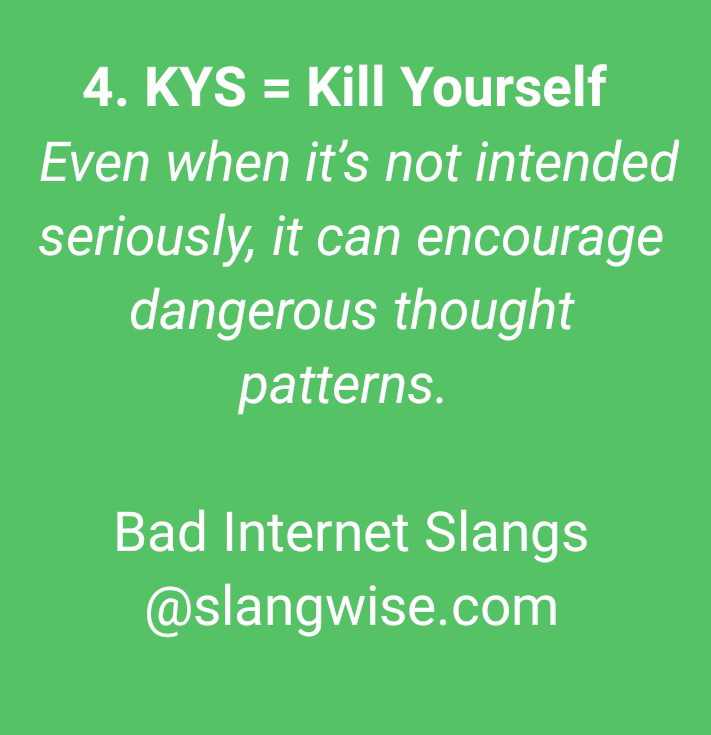
Perhaps one of the most disturbing slang terms, “KYS” is often used as an off-hand comment online when someone is frustrated, angry, or joking.
Unfortunately, it can have deeply damaging effects on vulnerable individuals, especially children.
Why Parents Should Be Concerned:
This term is incredibly harmful and should never be used in jest, no matter the context.
It trivializes the severity of mental health issues and can contribute to harmful behavior.
Even when it’s not intended seriously, it can encourage dangerous thought patterns.
Slangwise Tip:
Keep open lines of communication with your child about their feelings and online interactions. Encourage them to reach out to a trusted adult if they encounter such language or feel upset.
Clout-chasing is Gen Z’s slang that means chasing or seeking unnecessary online attention or approval – But, there’s more to it. Discover what teachers really don’t realize about clout-chasing.
5. FML (F**k My Life)
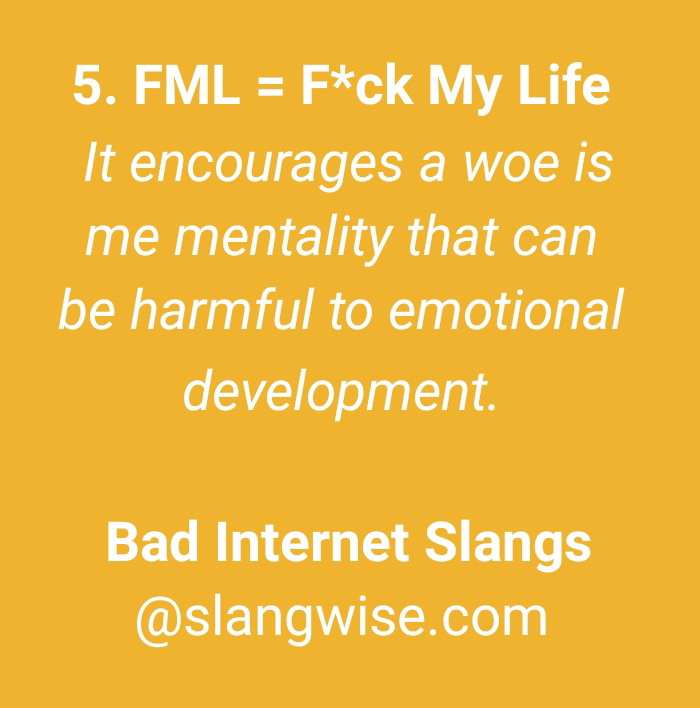
“FML” is used when someone feels overwhelmed by something negative in their life, often in a dramatic or exaggerated manner.
While it may seem like a harmless vent, it’s ultimately an expression of negativity that doesn’t promote healthy coping mechanisms.
Why Parents Should Be Concerned:
Children are still learning how to deal with difficult emotions, and expressing themselves with terms like “FML” can teach them to focus on life’s challenges in a pessimistic way.
It encourages a “woe is me” mentality that can be harmful to their emotional development.
Slangwise Tip:
Guide your child towards using healthier expressions of frustration, such as “This is tough, but I’ll get through it,” or “I’m feeling upset, but I’m learning from this.”
6. DTF (Down to F**k)
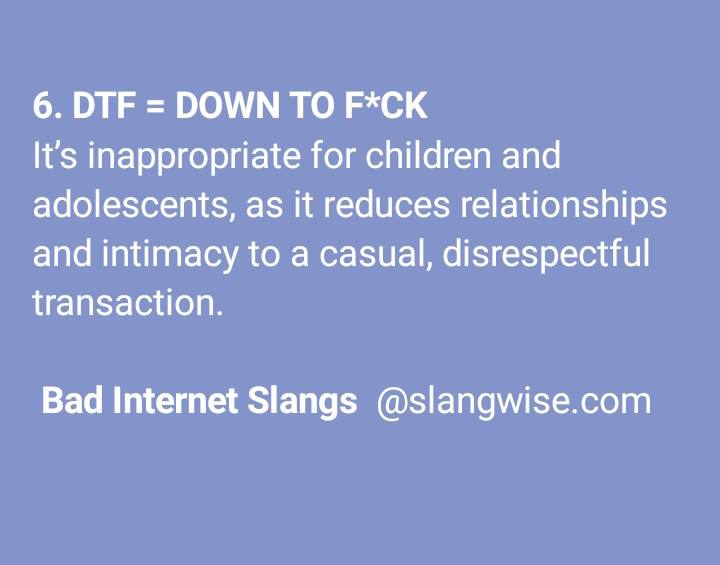
This term is often used in a sexual context to ask someone if they are interested in hooking up.
It’s inappropriate for children and adolescents, as it reduces relationships and intimacy to a casual, disrespectful transaction.
Why Parents Should Be Concerned:
Using this slang promotes a disrespectful and casual approach to sex, and it may put children in situations where they feel pressured to act or speak in ways that aren’t aligned with their values or maturity levels.
Slangwise Tip:
Educate your child about healthy relationships and the importance of respect.
Encourage them to avoid online conversations that focus on sexual themes, and remind them to talk to you if they encounter anything uncomfortable.
7. CBA/CBF (Can’t Be Aed/Can’t Be F**ked)
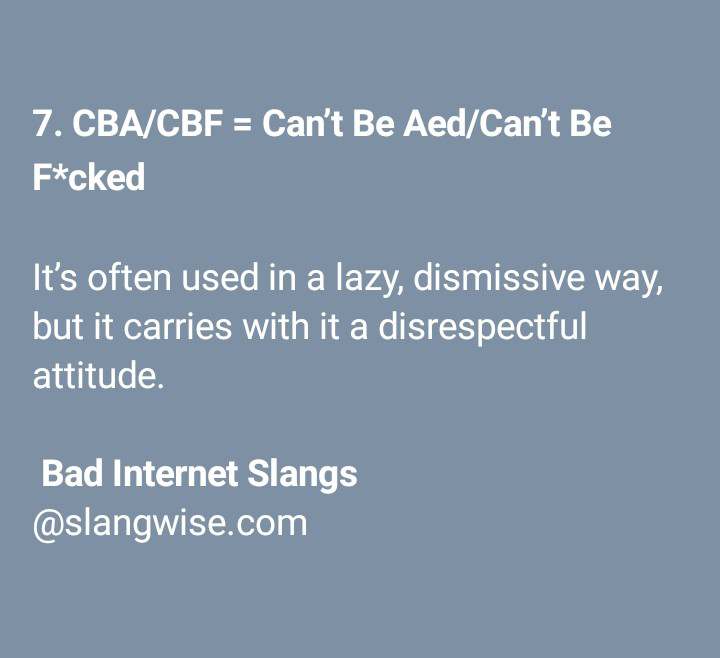
This slang phrase expresses a lack of motivation or interest in doing something.
It’s often used in a lazy, dismissive way, but it carries with it a disrespectful attitude.
Why Parents Should Be Concerned:
While it might seem like a harmless way to express indifference, using “CBA” or “CBF” shows a lack of care and can undermine a child’s sense of responsibility.
It’s important that children learn how to approach tasks with commitment, even when they aren’t excited about them.
Slangwise Tip:
Encourage your child to express their feelings constructively. If they’re struggling with a task, help them find ways to stay motivated and remind them that persistence leads to success.
READ ALSO: 36 Teen Slangs That Make Parents Cringe – A Brief Overview.
8. NSFW (Not Safe for Work)
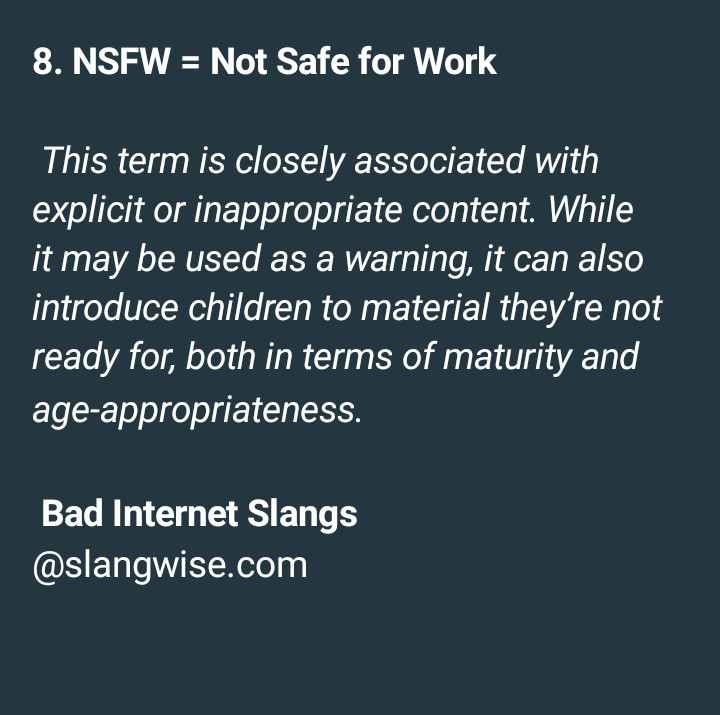
NSFW is a warning label typically used to signal that content is inappropriate for professional environments.
However, it often refers to explicit material, which is something children should absolutely avoid encountering.
Why Parents Should Be Concerned:
This term is closely associated with explicit or inappropriate content. While it may be used as a warning, it can also introduce children to material they’re not ready for, both in terms of maturity and age-appropriateness.
Slangwise Tip:
Set parental controls on devices and encourage your child to avoid websites or apps that might expose them to harmful material.
Be open about the importance of navigating the digital world responsibly.
9. Thot (That Ho Over There)
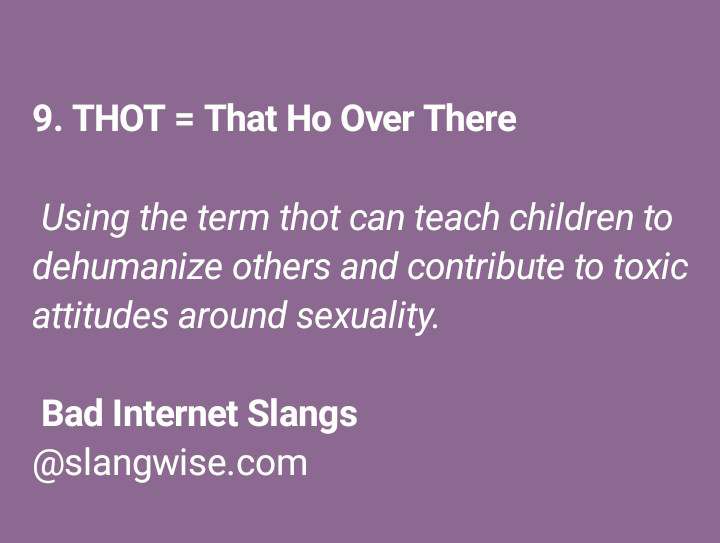
This derogatory term is used to describe someone, typically a woman, as promiscuous or promiscuous in a judgmental way. It’s a form of slut-shaming and can reinforce harmful gender stereotypes.
Why Parents Should Be Concerned:
Using the term thot can teach children to dehumanize others and contribute to toxic attitudes around sexuality.
It fosters an environment where young people may feel shamed or judged based on their actions or appearance.
Slangwise Tip:
Promote respect for others by encouraging children to speak kindly about people, regardless of their background or choices. Reinforce the value of treating others with dignity and understanding.
10. TW (Trigger Warning)
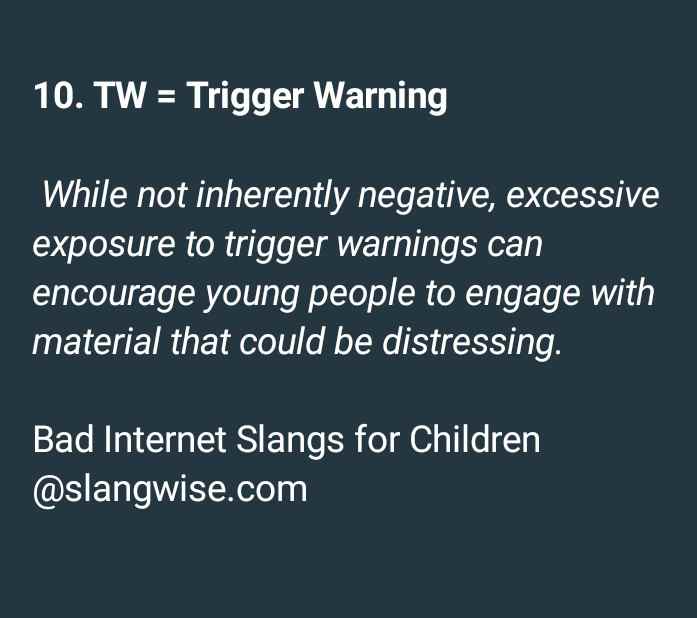
TW is meant to warn people about content that could potentially trigger negative emotional or psychological reactions.
While it’s a good practice in certain contexts, it can also lead to curiosity about harmful subjects.
Why Parents Should Be Concerned:
While not inherently negative, excessive exposure to trigger warnings can encourage young people to engage with material that could be distressing.
It’s important for children to understand that not everything online is suitable for them.
Slangwise Tip:
Help your child distinguish between what’s appropriate for them to engage with and what they should avoid. Encourage them to rely on trusted sources for emotional and psychological guidance.
11. Slay (Kill)
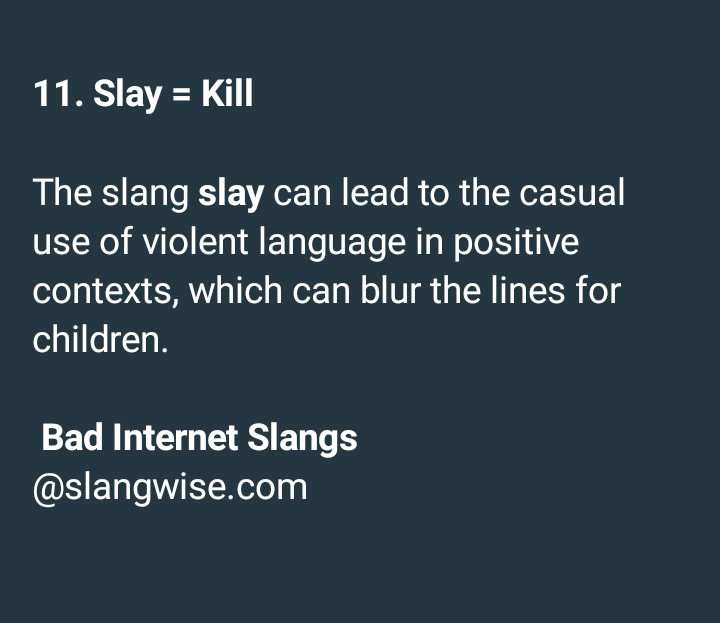
While slay these days according to Gen Z’s and Gen Alpha, is often used to mean doing something really well, it originates from a more violent term, which can confuse children.
The term also often gets overused to describe someone’s looks rather than their achievements.
Why Parents Should Be Concerned:
The slang slay can lead to the casual use of violent language in positive contexts, which can blur the lines for children.
It also places emphasis on outward appearance over inner qualities, which isn’t the best message to send.
Slangwise Tip:
Focus on helping your child develop a well-rounded sense of self, where their achievements and personal growth are celebrated, not just their appearance.
12. LMFAO (Laughing My F**king A** Off)
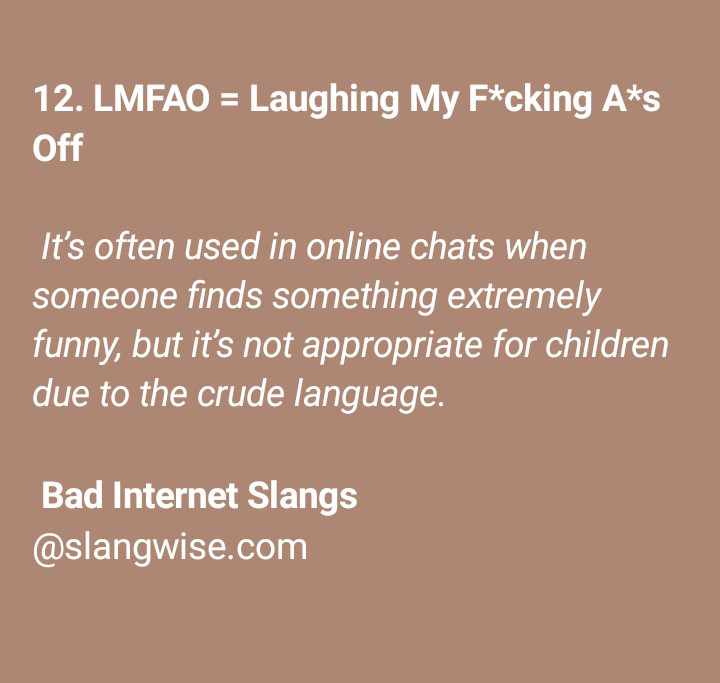
This is a more explicit version of “LMAO” and uses profanity for emphasis.
It’s often used in online chats when someone finds something extremely funny, but it’s not appropriate for children due to the crude language.
Why Parents Should Be Concerned:
The use of explicit language, even in humor, can contribute to a child’s tendency to normalize swearing in everyday conversations.
It can also lead to difficulty expressing humor without relying on inappropriate language.
Slangwise Tip:
Teach your child to express amusement and laughter in ways that don’t rely on profanity. Phrases like “LOL” or “That’s hilarious!” can keep the conversation lighthearted and fun without the vulgarity.
13. Booty Call
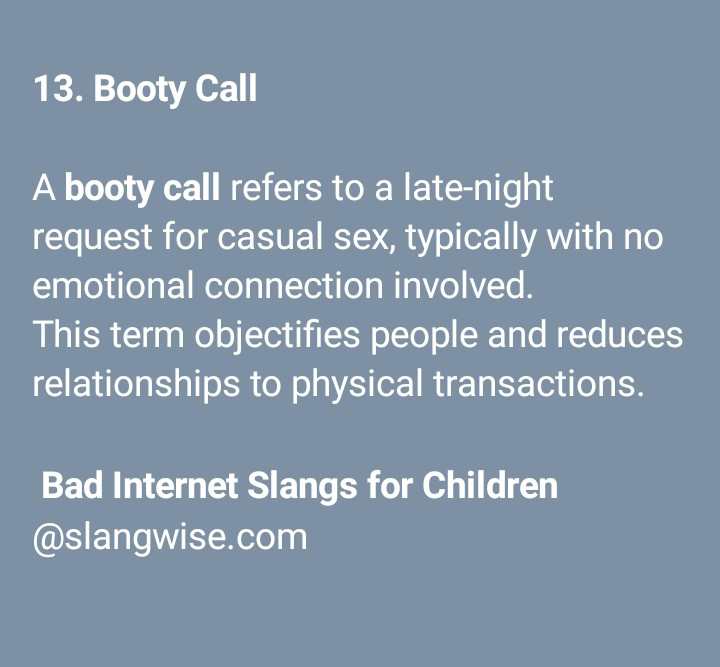
A “booty call” refers to a late-night request for casual sex, typically with no emotional connection involved.
This term objectifies people and reduces relationships to physical transactions.
Why Parents Should Be Concerned:
Introducing this term to young minds can normalize casual sexual behavior and diminish the importance of emotional connections in relationships.
It’s a term rooted in objectification and should be avoided.
Slangwise Tip:
Teach your child about the value of meaningful relationships and emotional intimacy. Encourage respectful language around relationships and help them understand the importance of mutual respect and consent.
14. Clap Back
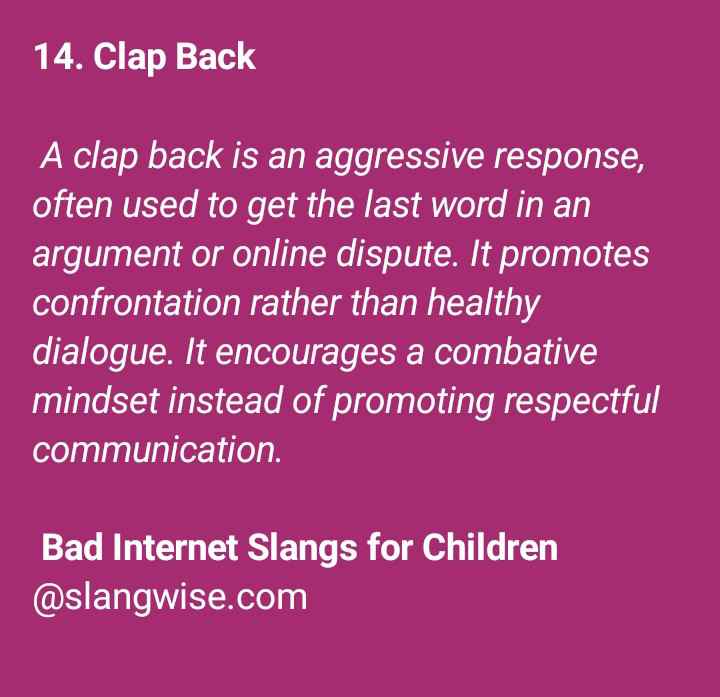
A clap back is an aggressive response, often used to get the last word in an argument or online dispute. It promotes confrontation rather than healthy dialogue.
Why Parents Should Be Concerned:
While defending oneself can be important, teaching children to “clap back” instead of resolving conflicts peacefully can escalate situations unnecessarily.
It encourages a combative mindset instead of promoting respectful communication.
Slangwise Tip:
Encourage your child to stand up for themselves in respectful ways. Teach them that there’s a difference between defending themselves and escalating conflicts.
Concluding Thought
How Parents Can Help Guide Their Children
Staying on top of the latest internet slang trends can be challenging, but it’s an essential part of parenting in today’s digital age.
By being aware of the terms your child is exposed to, you can protect them from harmful language and help them develop a healthier, more respectful way of communicating.
It’s about teaching them that words have power, both positive and negative, and that the way they express themselves shapes their identity and interactions.
Having open conversations with your child about internet slang, setting boundaries on what’s acceptable, and modeling healthy language will go a long way in ensuring that they communicate effectively and respectfully.
The digital world can be overwhelming, but with the right guidance, children can learn to navigate it safely.
Sources
Words banned in 2025 – Mid-Michigan NOW https://midmichigannow.com/news/local/cringe-and-era-among-words-banned-in-2025
Cringe,’ ‘era’ and other Gen Z slang banned in 2025, university … https://www.yahoo.com/lifestyle/cringe-era-other-gen-z-134356515.html
